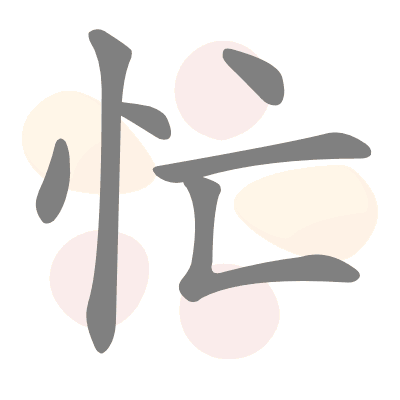忙
忙
adj./v. busy, very occupied; be busy, hurry
| 80% | 120% |
Register to get less ads.
Registration is free and once you are registered you use this word in your private vocabulary lists.
Then you can train your own vocabulary either here or using one of our applications for PC, iOS or Android.
Registration is free and once you are registered you use this word in your private vocabulary lists.
Then you can train your own vocabulary either here or using one of our applications for PC, iOS or Android.
Simplified Chinese Traditional Chinese |
Simplified stroke orders are based on the 'Standard of National Commonly-used Mandarin Chinese Characters (现代汉语通用字笔顺规范)', issued by the China National Language and Character Working Committee (国家语言文字工作委员会) on April 7th 1997. Traditional stroke orders are based on information issued by the Taiwan Ministry of Education.
手 手 idiom. be in a tearing hurry |
因 因 phr. He is so busy that he has kept working for a whole year without any holidays. |
他 他 phr. He is so busy with his work now and he has no free time. |
最 最 phr. Are you busy recently? |
你 你 phr. What are you busy with recently? |
急 急 adv. hurriedly |
百 百 phr. (to take time to do something) from a very busy schedule |
不 不 adj. not busy |
忙 忙 phr. (Are you) busy? |
你 你 phr. Are you busy? |
很 很 phr. very busy |
哈 哈 phr. Harry had a lot of things (to do), and he was busy for the entire day. |
忙 忙 idiom. steal a little leisure from a busy life; steal a moment of leisure under pressure of a heavy job |




